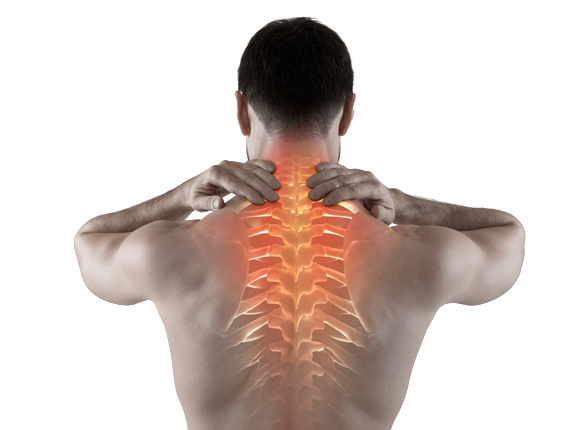Neck Pain

Neck pain – Causes, Symptoms and Diagnosis
Neck pain, also known as cervical pain, is a common medical condition that affects many Americans at some point in their life.
Any of the neck structure can be affect by pain. These include the: muscles, nerves, bones (vertebrae) or the disks between the bones. No matter what the root of pain is, a spine specialists at VIP Centers can pinpoint the source of pain and develop a customized, advanced treatment plan to provide relief. Our multidisciplinary approach and conservative treatment methods are usually used to help treat the symptoms, decrease pain and improve function. If you are experiencing cervical symptoms, contact the pain management specialists at VIP Medical Group to schedule a consultation. Conditions such as herniated discs, spinal stenosis, and pinched nerves can commonly cause cervical symptoms and can be easily fixed by non-surgical treatment options.

Symptoms of Neck Pain
The cervical spine (neck) is a complex structure between your head and back; because of this, it’s not uncommon for neck pain to radiate to other areas in your body and cause other symptoms as well. Symptoms of neck pain varies, however, the most common ones are:
- Stiffness
- Tightness
- Burning
- Aching
- Pressure
- Dizziness
- Swelling
- Difficulty with swallowing
- Stabbing or shooting pain
- Radiation of pain down an arm and or hand
Along with your neck pain, depending upon the cause, you may also experience:
- Headaches
- Shoulder pain
- Arm pain
- Facial pain
- Back pain
- Hand pain
Your muscles can feel sore or tense in the neck, face, or shoulders. Muscles can spasm when they go into a state of extreme contraction (e.g., after whiplash) and your movement may be limited: you may not be able to turn your head. If nerves are involved, pain, tingling, numbness, or weakness can develop also in your shoulders, arms and hands. Furthermore, if nerve compression is severe, symptoms can include pain, numbness, tingling in your legs, loss of bladder or bowel control, or loss of strength and problems with coordination. These symptoms require immediate medical attention.
In order to better understand the nature of the patient’s pain, it is very important to identify and recognize the type, severity, frequency and location of the neck pain. These specifics sheared with your physician will help to make a complete and accurate diagnosis and ensure the proper treatment.

What causes neck pain?
There are many different causes of neck pain, including disorders, diseases or just everyday tweeks in the neck. Some of the most common are sprains and strains, which typically resolve in a few days or weeks with rest and pain medication. The common causes of ACUTE NECK PAIN include:
- Auto accidents: whiplash is usually associated with car accidents and occurs when the neck and head are unexpectedly and suddenly forced backward and then forward, putting the cervical spine through lightning-quick motions and extreme stresses. These unnatural and forceful movement affects the muscles and ligaments in the neck. Muscles response by tightening and contracting creating muscle fatigue resulting in pain and stiffness.
- Sports injuries: some injuries, especially sports-related injuries, may cause muscle strains and ligament sprains in the neck. Staying active or playing sports regularly can put a lot of wear and tear on the muscles and ligaments of your neck, causing pain and discomfort. This type of injury usually results in neck pain that is aggravated by activity. Any activities that involve repeated or prolonged movements of the neck can result in a strain (injury to a muscle), sprain (injury to a ligament), or a spasm of the neck muscles (involuntary contraction of the muscle that tightens the muscle to a point where movement is not possible). With rest and anti-inflammatory medication, neck sprains and strains usually heal over time.
- Sleeping in the wrong position: wrong sleeping positions can affect your entire body, causing immediate pain and long-term damage. While you sleep your head can fall into a position that puts unnecessary stress upon your neck muscles and may agitate your neck. There are two positions that are best for sleeping: on your side and on your back. Sleeping on your stomach forces your neck into an awkward position, which may cause neck pain. It is extremely important to pick a pillow that’s most comfortable for you.
- Poor posture: sitting with head and shoulders pushed forward in front of a computer, with head jutted forward to read the screen is one of the most common causes of neck pain. This posture causes considerable strain on the neck muscles, which in turn can contribute to neck aches, pains, and even chronic headaches.
CHRONIC NECK PAIN is often caused by a degenerative spine condition, which is a condition that develops as the spine naturally wears down with age. Chronic neck pain can last several months and typically requires a treatment regimen for pain relief. These conditions can cause the spine to move out of alignment and press a nearby nerve root, causing your pain.
The most common degenerative spine conditions that cause neck pain include:
- Degenerative Disc Disease: is a condition typically associated with the aging process on your spine, specifically on your intervertebral discs. This occurs when one or more of the discs in the cervical spine starts to break down due to wear and tear, these discs are used to cushion each cervical vertebrae. Intervertebral discs, also called intervertebral fibrocartilage or spinal discs, provide the padding between the vertebrae of the spine. They have an elastic structure, made of fibrocartilage tissue. This degenerative process causes your discs to lose their ability to cushion your movements. Discs usually become weaker, lose their flexibility, elasticity, and shock-absorbing characteristics and may become thinner. When this happens, the discs change from a supple, flexible state that allows fluid movement, to a stiff and rigid state that restricts your movement. It can alter the strength and shape of one or more of your discs. Furthermore, over time, you may develop a bulging disc or a herniated disc, where the disc material can press on nerve roots, causing neck pain, tingling or numbness and may radiate into your arm.
- Muscle strain: ongoing overuse of your neck muscles (which can be caused by a poor neck position during everyday activities, particularly computer work), sleeping in a position that strains the neck can trigger neck muscle strain, causing chronic neck pain and stiffness. The pain is often worse with movement and may be associated with headaches, muscle spasms and restriction of neck movements.
- Herniated disc: cervical herniated disc occurs when a disc in the spine is compressed and breaks open, leaking the inner disc fluid into the spinal canal. Patients with a herniated disc in the cervical spine may experience chronic neck pain and radiating pain in the arm, neck, jaw and/or head. Some severe cases of herniated discs may cause occasional facial numbness. Herniated discs can cause increased pressure on the nerve roots as they exit the spinal cord. This will then cause pain in the neck as well as pain, numbness and weakness in the arms.
- Cervical Spondylosis/Osteoarthritis: occurs when the cartilage that cushions the vertebrae is deteriorating and the compressed joints between the bones of your spine are causing swelling and irritation. It’s caused by everyday use over many years and is quite normal as you get older. The discs between the bones become thinner and the spaces between the bones narrower.
- Cervical spinal stenosis: occurs when a degenerative spine condition, such as herniated disc or a bone spur, displaces the normal anatomy and narrows the spinal canal or compresses a nerve root. Pain associated with that condition is caused by a gradual narrowing of nerve pathways in the cervical (upper) spine causing compression of the spinal cord and nerves. Pressure on the nerves in the spinal cord region can cause tingling, pain in the arms, numbness, or pain in the hands and legs. The spinal column can become constricted by a bone spur or another obstruction, but this usually is a result of wear and tear on the body.
- Cervical radiculopathy aka “pinched nerve”: occurs when there is compression or pressure on a spinal neck nerve. This pressure often comes from surrounding bone or soft tissues. When the nerve in the neck is compressed or irritated where it branches away from the spinal cord, this may cause pain that radiates into the shoulder, as well as muscle weakness and numbness that travels down the arm and into the hand.

What are the Non-Surgical Treatment Options for Neck Pain?
Because there are so many causes and symptoms of neck pain, there are multiple ways to treat it.
Which treatment options are most appropriate depend on the diagnosis, the severity, the current symptoms, treatment goals and preference.
Epidural steroid injections
Cervical Epidural Steroid Injection is a minimally invasive, simple, safe, and effective non-surgical treatment that involves the injection of a steroid medication similar to cortisone into the epidural space of the spine. The epidural space is a specific area where inflamed nerves are located in the spine. The intent of this procedure is to reduce inflammation and therefore relieve pain in the neck, shoulders and arms caused by a pinched or inflamed nerve in the cervical spine. Conditions such as spinal stenosis, herniated discs, or arthritis can compress and press nerves, causing inflammation, discomfort and pain. The cervical epidural steroid injection procedure involves injections into the surrounding area that help with pinched nerve pain management and decrease the swelling and inflammation.
Trigger point injections
Neck pain is often associated with trigger points, commonly known to be a sensitive areas within muscle or connective tissue that becomes painful when touched or overworked. These injections are considered to be a very effective treatment option for inactivating trigger points and providing prompt relief of symptoms from neck pain. These injections are used to treat painful areas of muscle that contain trigger points, these are band or knots of muscle that form when muscles get contracted and do not relax. The most common sites for trigger point injections are the neck, back of head and shoulders. In this procedure, a small needle is inserted into the patient’s trigger point. The injection contains a local anesthetic and corticosteroid, and can be performed very safely with no side effects or complications. With the injection, the trigger point is made inactive and the pain is alleviated. Typically, a brief course of treatment will result in longer term relief. Injections are done in the office setting by the doctor and usually take just a few minutes and several sites may be injected in one visit.
Cervical Facet Block: a cervical facet joint injection is a simple, safe, and effective minimally invasive treatment for spinal pain that involves the injection of a small amount of local anesthetic or steroid medication into the facet joints in the cervical spine, which can anesthetize the facet joints and block the pain. This is done using fluoroscopic guidance for precision imaging. Often cervical facet blocks work well patients who have arthritis of the neck and they can get significant relief after 1 or 2 injections. Often, cervical facet blocks are known as medial branch blocks which can be done in the office setting and only takes about 30 minutes to perform.
At VIP Medical Group, our goal is to maximize patients ability to function through muscle, tendon, nerve, and joint strengthening and protection. The non-surgical treatment options allow us the opportunity to carefully restore your mobility. Because we believe that every patient deserves to live a healthy and comfortable life, our VIP Medical Group spine specialists work to develop multidisciplinary treatment plans that are personalized for each patient’s needs and. Our Harvard trained physicians will explore all of the more conservative options available that may be effective at relieving your symptoms. Steroid injections are just one of the treatments that we offer to treat persistent pain in your neck.
Request an appointment
We are experts in minimally invasive procedures with zero downtime, allowing you to resume regular activities the same day. Leave us your information, and we will reach out to help you verify your insurance coverage, and schedule an appointment with one of our vein specialists. We are a non-participating provider with BCBS, empire, Aetna, GHI, Cigna, United Healthcare, Oxford, BCBS Horizon, Magnacare and we will work directly with your insurance company to help you get treated with no surprise bills.
